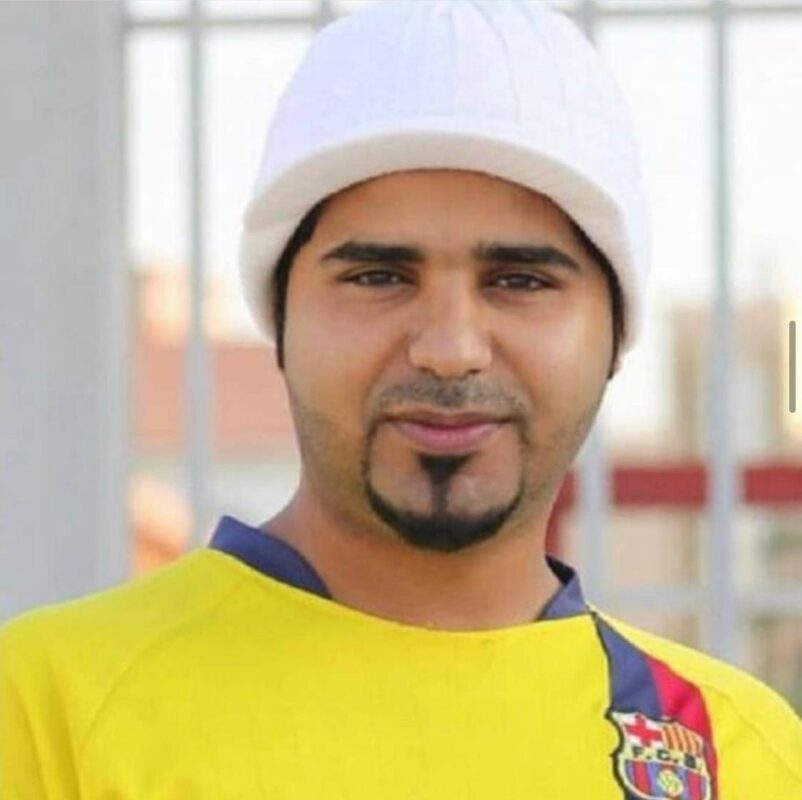Bahrain Center for Human Rights expresses its grave concern for the safety of the detainee, Habib Ali Al-Fardan, who suffers from head cancer, and who faces imminent danger due to medical negligence and the failure to provide him with the necessary health care.
Habib Al-Fardan, 37, was arrested on May 15, 2015, after his home in the village of Sar was raided without an arrest warrant. Months before his arrest, Habib had undergone surgery to remove a large tumor from his brain in Germany, and the doctors had recommended that after the end of his operation, he should avoid physical and psychological stress and undergo an MRI scan every 3 months. In their interview with the center, Habib’s family indicated that his health was deteriorating due to the neglect of his treatment and the irregularity of his medical appointments.
After the arrest, Habib was subjected, according to the testimony of his family, to enforced disappearance, and during interrogation he was subjected to ill-treatment, and the threat of harming his head, specifically in the place where he was subjected to the operation. After that, he appeared before the Public Prosecution, more than two weeks after his arrest, and was prevented from speaking with the prosecutor or his lawyer, and he could only sign pre-prepared confessions for fear of being returned to the investigations building and subjected to torture again. After signing the confessions, Habib was transferred to the Dry Dock Detention Center. He was sentenced to 75 years in prison for possession and manufacture of explosive devices and attempted murder. He was then transferred to Jaw Central Prison to serve his sentence.
According to the statement received by the Bahrain Center for Human Rights from the family of Al-Fardan, his health condition has been deteriorating continuously since his arrest until now. However, he does not receive adequate health care, and the previous symptoms of the disease have returned to him, as he complains again of memory loss, difficulty concentrating, and frequent headaches, as she confirms. The family, the return of the tumor to his head and his need for quick treatment, and not ignoring his medical appointments, as happened on November 9, 2021.
Bahrain Center for Human Rights had previously documented many cases of lack of medical care, including the human rights detainee Abdulhadi Al-Khawaja, the human rights activist Dr. Abduljalil Al-Singace, Sheikh Muhammad Habib Al-Miqdad, Sheikh Mirza Al-Mahrous, Mr. Hassan Mushaima, Mr. Abdul-Wahhab Hussein, the detainee Muhammad Al-Raml and others.
In 2021, three victims died as a result of medical negligence inside the prison, and they are the detainee Abbas Malallah, the detainee Hussein Barakat and the former detainee Ali Qambar.
The Center affirms that health care is a right guaranteed in international laws, and violating this right violates the Standard Minimum Rules for the Treatment of Prisoners, or the Nelson Mandela Rules, which affirm that prisoners in need of specialized treatment must be transferred to specialized institutions or civilian hospitals. Also, international human rights mechanisms confirm that imposing restrictions on elderly or sick prisoners is considered ill-treatment.
Based on the testimony received from the detainee’s family, the director of Bahrain Center for Human Rights, Ms. Nedal Al-Salman, urges the concerned authorities to fulfill their obligations in the field of human rights and to release the detainee Habib Fardan, taking into account his health condition. As Bahrain Center for Human Rights expresses its deep concern about the lack of health care, inadequacy or delay, which sometimes exposes detainees to health risks, it calls for:
* The release of Habib Al-Fardan and all sick detainees to ensure that they receive the necessary medical care.
* The need for the official oversight bodies to carry out their duties, investigate cases of medical negligence and hold those responsible accountable

